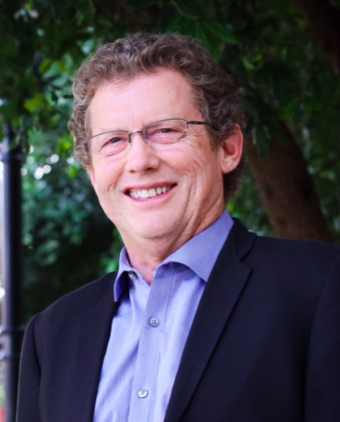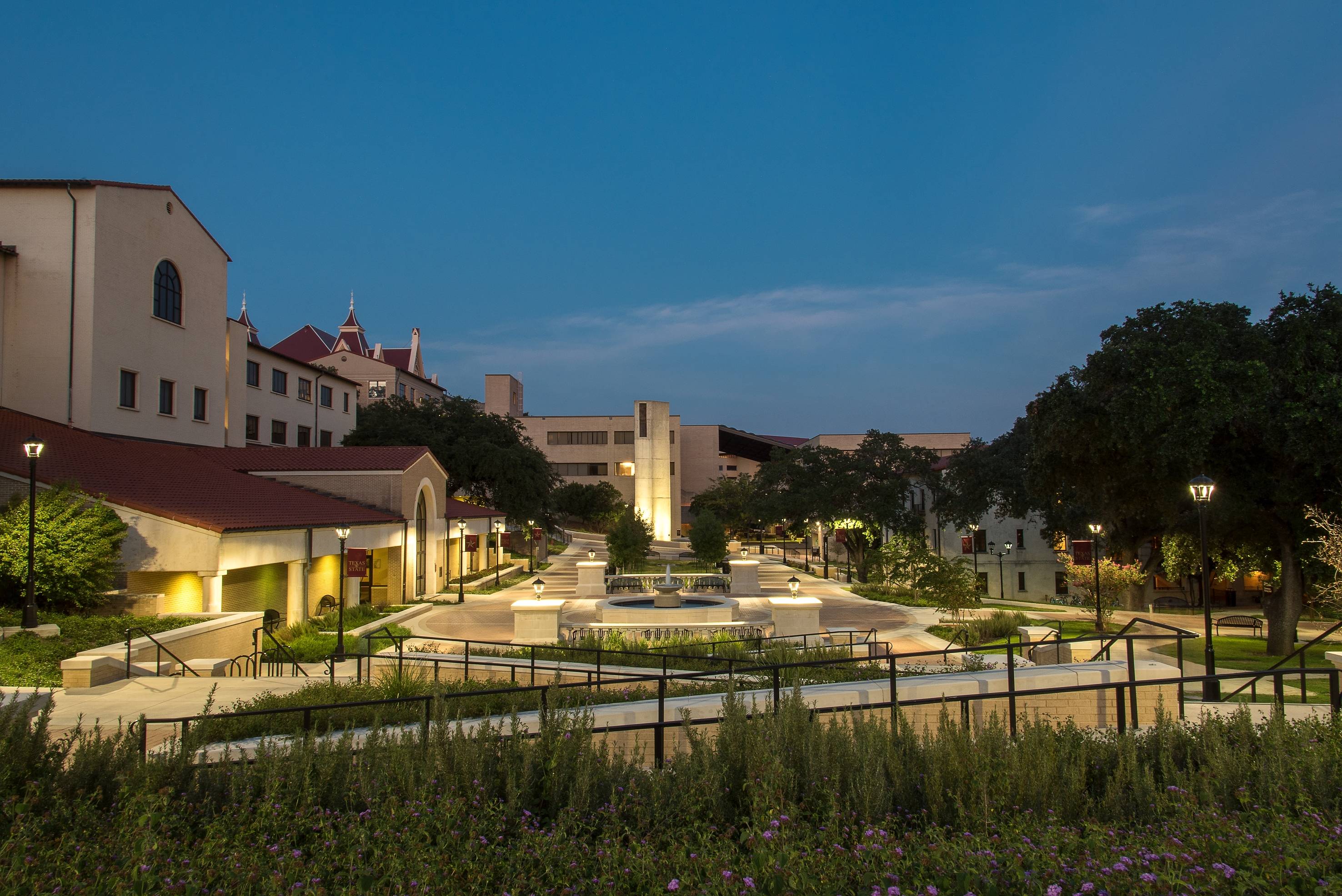
Patrick Cox has made contributions in two areas of importance to Texas- its history and its environment. A leader in our state's historical community, Patrick continues to break new ground with his scholarship on Texas political history. And, like some of the politicians, he studies, his interest in the environment has led him to fight against outdated power structures in the quest for clear air and water and affordable energy for Central Texans.
Patrick grew up in Houston and majored in history at The University of Texas at Austin. When he graduated from UT in 1974, he and his mother and stepfather started the Wimberley View newspaper in Wimberley, and Patrick became its editor.
The paper was bold in its coverage of controversial issues, winning many journalism awards. It also made a few mistakes. Patrick recalls writing a photo caption advertising a new business that sold “Country-fied Chicken-fried Chicken.” But when the paper was published, the caption read “Country-fied Chicken-fried Children.” Mortified, he went to the business to apologize, but the owner said, “This is the greatest thing that’s ever happened. I’ve had more people come in since the paper came out. In fact, some of them offered to bring their children!”
While he was on the newspaper, Patrick met his wife Brenda on a blind date. Brenda was working on a degree in medical technology at Southwest Texas, and they were introduced by a mutual friend. The friend told her that Patrick had a really hot sports car, an orange Mazda RX7 with a sunroof. But, because Brenda lived on a farm in Niederwald, Patrick figured that he’d impress her by arriving in the pickup truck that the newspaper used for deliveries. He took her on a lovely date, and he said she was cordial to him, but at the end of the evening she told him she really wished he had picked her up in his sports car. So, that gave him a reason to ask her on another date. They have a recently married daughter, Lauren.
In the early ‘80s, Patrick campaigned for State Rep. Dan Kubiak when he ran for Texas Land Commissioner against Garry Mauro. Mauro won the race, but he was so impressed by Patrick’s hard campaigning for Kubiak that he hired Patrick as Assistant Land Commissioner.
Patrick served for several years in that post, but he really wanted to go back to school. So, he enrolled at Southwest Texas to obtain a master’s degree in History. He chose the program because of its reputation and because he knew Bill Brunson on the History faculty. He credits Professors Brunson, Everette Swinney, Jim Pohl, Tug Wilson, and Bill Liddle with teaching him the proper approach to studying history through research.
Patrick, as a 4.0 student, was the first recipient of the History Department's Bill R. Brunson Research Award for best master's thesis in 1989.
As Patrick returned to The University of Texas to obtain a PhD in History, Texas Sen. Ralph Yarborough was donating his papers to UT’s Dolph Briscoe Center for American History. Patrick’s advisor, the Presidential Historian Lewis Gould, told Patrick, “If you write a dissertation on Yarborough and produce a book, that will be a great achievement.” Sen. Barbara Jordan, who sat on Patrick’s dissertation committee, echoed the need for a book on Yarborough. Patrick’s award-winning book, which came out in 2002, is the first objective biography of the politician known as The People’s Senator, for his support of Great Society legislation on civil rights and the environment. Texas’ first State Historian, our own Dr. Frank de la Teja, calls the book “extremely significant.”
As Associate Director of the Dolph Briscoe Center for American History, Patrick oversees the Congressional History Collection, historic preservation programs at Winedale, the Sam Rayburn Library and Museum in Bonham, and the John Nance Garner Museum in Uvalde.
Patrick tells a story about Ralph Yarborough that you can keep in mind when you visit the Garner museum. Yarborough went to Uvalde to ask Former Vice President Garner for his endorsement for the Senate. Garner was famous for “convening the Board of Education” after 5 o’clock—asking friends and colleagues to join him in having a drink, or as he put it, to “strike a blow for liberty.” Yarborough, a well-known teetotaler, knew that when he went to Garner’s house he was going to have to strike a blow for liberty if he wanted Garner’s endorsement. Yarborough figured Garner would pour a shot of bourbon for everyone and they would toast the endorsement and that would be that. Garner did pour small glasses for everyone else but he gave Yarborough a large tumbler and filled it up. Chagrined, Yarborough said to himself, “I know I gotta drink it but what am I gonna do?” He recalled that, as a kid, his mother used to make him drink castor oil. So he just pretended he was drinking a big ole bottle of castor oil, and down it went. He got the endorsement and won the election and had a big shot of bourbon to go with it.
Ranking Patrick among the most distinguished historians in Texas, the current Texas State Historian Dr. Light Cummins applauds Patrick for his efforts to bring Texas history to the public. In addition to his biography of Yarborough, Patrick has written a book on the Texas newspaper barons who built the state’s modern identity—visionary publishers such as Jesse Jones and the Hobbys in Houston, the Dealys in Dallas, and Amon Carter in Fort Worth who laid the groundwork for Texas’ huge economic expansion after WWII by presenting Texas as a Southwestern rather than a Southern state.
He has also co-written a book on the Texans who wielded power in Washington, D.C. from 1913 to the end of the 20th century. The book’s biographies cover personalities such as President Woodrow Wilson’s top advisor, Edward M. House; House Speakers Morris Shepherd, Sam Rayburn, and Jim Wright; Sens. Barbara Jordan, John Tower, and Lloyd Bentsen; Vice President John Nance Garner; and Presidents Lyndon B. Johnson and George Bush. As a national authority on the subject, Patrick often advises members of the Texas delegation on historical issues and works with the Historian of the U.S. House and the Historian of the U.S. Senate.
In March, the University of Texas Press published Patrick’s fourth book, The House Will Come to Order. In it, he charts the evolution of the Texas House Speaker’s role from a relatively obscure office in the 19th century to one of the most powerful in the state. It includes chapters on such well-known personalities as Allan Shivers, Price Daniels, and Coke Stevens and on 10 former speakers who are still living. Patrick says his toughest challenge was to convince Former Speaker Gus Mutscher, known as Judge Mutscher in his hometown of Brenham, to agree to be interviewed. Mutscher feared that Patrick would want to focus on his conviction in the Sharpstown Scandal which drove him out of office, but when Patrick told The Judge that he wanted to ask him also about the rest of his political career and how he contributed to the Speaker’s office, Mutscher was happy to talk.
During the summers of his childhood when his family visited the Hill Country, Patrick developed an interest in conservation and the environment. He has been an effective advocate on those issues, heading the Barton Springs/Edwards Aquifer Groundwater District, the Wimberley Valley Watershed Association, and serving on the Jacob’s Well Land Trust near Wimberley.
In his days as editor of the Wimberley View, Patrick conducted a major investigation of wrongdoing at the Pedernales Electric Coop, the nation’s largest electric coop, which serves Central Texas. Now, 20 years after his investigation, the Coop board has undergone a widely publicized overhaul, and Patrick sits on the board as one of its new members. In office, he has spearheaded reforms in the board’s governance that will ensure open meetings, open records, and fair elections, and he is helping to direct the coop’s development of clean and efficient energy sources. Because of his success in correcting problems at the PEC, he was recently invited to speak to the conventions of both the state and national associations of electric coops.
In Wimberley, Patrick has also served as president and scholarship committee chair of the Lions Club, initiating a program which now gives more than $50,000 a year in full-ride scholarships. He has many other honors to his credit—advisor to the Bob Bullock Texas History Museum, contributor to National Public Radio, Public Television, and C-Span, membership in the Texas Philosophical Society, and much more.
